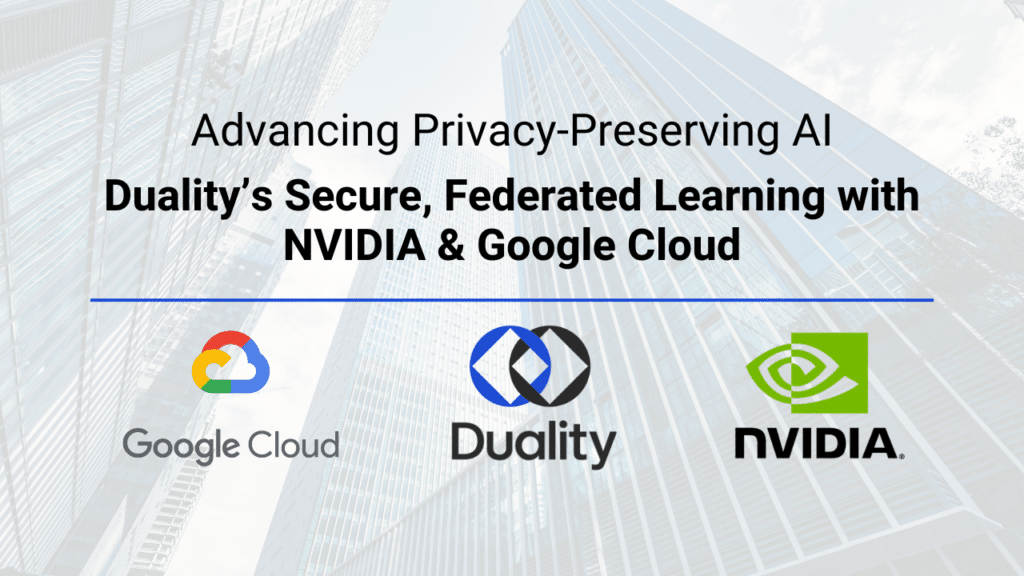Generative AI (Gen AI) has dominated AI discussions, but a new concept is emerging: Agentic AI. The evolution of Gen-AI takes us to a new paradigm shift for software development and user interaction, agentic AI combines large language models (LLMs), retrieval-augmented generation (RAG), and structured decision-making to enable autonomous, goal-driven AI systems that interact, adapt, and improve over time—all with minimal human intervention.
However, for agentic AI to reach its full potential, it requires access to large, high-quality, and diverse datasets to train and refine its models. Industries such as healthcare, finance, and national security hold vast amounts of valuable data, yet strict privacy laws and compliance regulations restrict how this data can be shared and used.
This raises a key challenge: How can AI agents access the data they need while maintaining security and privacy? The solution lies in Privacy-Enhancing Technologies (PETs)—advanced techniques that allow AI to analyze and learn from sensitive data without exposing raw information. This blog explores why agentic AI requires more data, the privacy barriers it faces, and how PETs enable AI innovation while safeguarding security.
What is Agentic AI and Why Does it Need More Data?
Agentic AI uses natural language to interact with users, external tools, and systems, executing complex tasks to achieve a specific goal. Unlike traditional AI, which relies on static datasets and human intervention, agentic AI:
- Learns and adapts to new information in real-time.
- Operates autonomously, requiring minimal human oversight.
- Optimizes decision-making processes based on evolving conditions.
For agentic AI to work effectively, it needs large, high-quality, and diverse datasets.
Example: Agentic AI in Healthcare
Imagine an AI-powered oncology assistant that helps doctors personalize cancer treatment plans. A traditional AI or machine learning model might analyze past research and provide general treatment recommendations based on predefined protocols. Instead, agentic AI continuously adapts, pulling in real-time patient data, genomic profiles, past treatment responses, and the latest clinical trial results to tailor recommendations for each patient. It breaks down complex workflows into multi-step problems, adjusting treatment plans based on new relevant information including lab results, medication side effects, and evolving medical guidelines.
Because agentic AI systems are less strict and more flexible in the way they access data, they may require more data than traditional applications or access to new sources of data. But, without a way to securely collaborate with sensitive data, agentic artificial intelligence systems cannot reach their full potential—especially in regulated industries like healthcare and finance.
The Challenge: Access to Data with Privacy and Compliance Roadblocks
The biggest barrier to agentic AI is not a lack of data, but the inability to use and share this data safely. Many industries have valuable datasets that could improve AI models, but privacy laws, compliance regulations, and security concerns prevent organizations from freely sharing the data AI needs.
For example:
- Healthcare – Strict HIPAA regulations restrict hospitals from sharing patient data, making it difficult to train AI-driven diagnostic tools.
- Finance – Banks must protect transaction data from fraud while complying with GDPR and financial privacy laws.
- National Security – Intelligence agencies need secure ways to collaborate on classified information.
Without a solution, AI models remain limited, biased, or ineffective, lacking the data diversity needed to improve accuracy and performance.
The Future of Agentic AI with Privacy-Preserving Data Collaboration
Organizations no longer have to choose between AI innovation and data privacy—Privacy-Enhancing Technologies (PETs) enable both. By allowing AI to process and learn from data without exposing it, PETs unlock the full potential of agentic systems in industries where security and compliance are top priorities.
Agentic AI represents a fundamental shift in software architecture and user experience. Instead of static applications, AI agents dynamically execute workflows composed of multiple tasks, with each task handling a specific operation. This modular, task-driven approach allows AI systems to flexibly adapt, automate processes, and optimize decision-making in real time.
Now, imagine integrating a “PET task” into this workflow—a dedicated privacy-preserving operation that ensures sensitive data remains protected at every stage of AI-driven processing. By embedding PETs directly into AI workflows, organizations can seamlessly enhance security without disrupting performance, making privacy an inherent part of agentic AI execution.
The next frontier of AI innovation includes:
- AI models that continuously learn from secure, global datasets while maintaining privacy.
- Cross-industry AI collaboration without the risk of data breaches.
- Smarter, more ethical AI systems that balance innovation with security.
With Privacy-Enhancing Technologies, the future of AI is secure, ethical, and limitless.
The Role of Privacy-Enhancing Technologies (PETs) in Agentic AI
While agentic AI is still emerging in industries handling sensitive data, PETs make it possible to train and deploy AI while preserving privacy. Here’s how:
Differential Privacy: Protecting Individual Identities
How it works: Adds statistical noise to datasets, preventing AI from identifying individual records.
Use Case: AI models can analyze disease trends without accessing specific patient records.
Federated Learning: Training AI Without Centralizing Data
How it works: AI models train across multiple devices or institutions without moving raw data.
Use Case: Banks detect fraud across multiple financial institutions without sharing transaction details.
Homomorphic Encryption: Computing on Encrypted Data
How it works: AI can analyze fully encrypted data without ever decrypting it.
Use Case: Financial institutions assess credit card transactions securely, without exposing details.
Trusted Execution Environments (TEEs): Secure AI Processing
How it works: AI computations are performed in isolated, tamper-proof environments.
Use Case: Model providers can build custom models (e.g. risk score models) that are tailored for their customers without being exposed to their client’s sensitive information.
With PETs, organizations can harness the full power of AI while ensuring compliance, security, and privacy.
Agentic AI & PETs: Real-World Examples
While agentic AI and PETs are still evolving, several real-world initiatives demonstrate their potential:
- Financial Data Sharing with PETs – Research has explored integrating PETs into Central Bank Digital Currencies (CBDCs) to securely share financial data among institutions while preserving privacy. This approach aligns with the principles of agentic AI by enabling collaborative decision-making without exposing raw data.
- Confidential Computing in Multi-Party Analytics – Organizations use TEEs to allow multiple parties to perform AI-driven analyses on sensitive data while keeping it encrypted. Hospitals can securely collaborate on AI-driven disease detection models by using Trusted Execution Environments (TEEs), allowing AI to analyze combined patient data without exposing sensitive health records or violating privacy laws.
These examples highlight the growing role of PETs in advancing agentic AI across sensitive industries.
How Duality Technologies is Driving the Future of AI Collaboration
Duality Technologies provides a secure collaboration platform that enables organizations to leverage more data securely while maintaining compliance with strict privacy regulations. With its Privacy-Enhancing Technologies (PETs)-powered solution, businesses can break down data silos, drive AI innovation, and extract insights—all while ensuring security and regulatory alignment.
- Better AI Performance – More data leads to more accurate, bias-free AI models for smarter decision-making.
- Privacy-First Collaboration – AI can securely operate across industries without violating compliance laws.
- Unlocking New Possibilities – Organizations in healthcare, finance, supply chain management, and cybersecurity can finally use AI without sacrificing privacy.
To further enhance secure AI collaboration, the Duality Platform provides robust APIs that enable AI agents and applications to seamlessly interact with and leverage PETs, streamlining privacy-preserving data analysis and AI model training without exposing sensitive information. Duality also integrates with leading cloud, enterprise, and government platforms—including AWS, Google Cloud, Microsoft Azure, Oracle, and Carahsoft—allowing organizations to implement privacy-first AI within their existing infrastructure. Through partnerships with Intel, IBM, DARPA, and LSEG, Duality continues to advance privacy-preserving AI technologies for large-scale, high-security environments, empowering organizations to unlock the full potential of AI while maintaining compliance and data confidentiality.
Unlock AI’s Full Potential with Secure Data Collaboration
Agentic AI needs more data to thrive, but privacy challenges have held it back. Duality Technologies’ PET solutions remove these barriers, ensuring AI can securely analyze sensitive data without exposure.
From healthcare to finance, AI can now drive innovation while maintaining security, compliance, and trust.Want to unlock the full potential of agentic AI with privacy-first data collaboration? Discover how Duality’s PET solutions can help your organization today.















